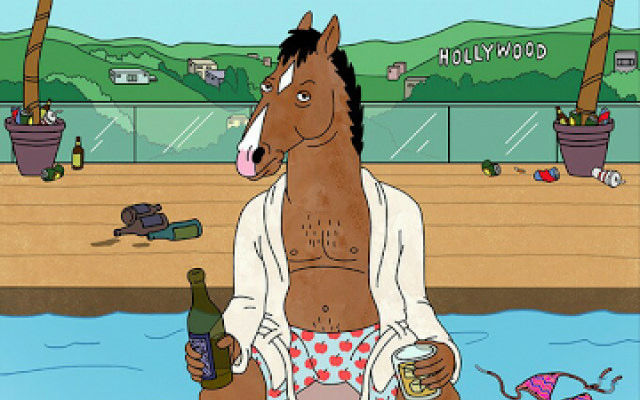“Bojack Horseman” is an animated Netflix original series about a washed-up actor named Bojack living in Los Angeles. His biggest role was when he was the main character of a ’90s sitcom called “Horsin’ Around.” Currently, Bojack is 52 years old, depressed, and an alcoholic. He’s also an anthropomorphic talking horse.
In the Bojack Horseman universe, humans and anthropomorphic animals live together, work together, and often even marry and have children together. The show never treats this as strange. In fact, the animals are not treated as though they are a different species, but they are treated as though they are simply a different race or ethnicity.
By season three, you get used to it.
Season three is by far the best season of Bojack Horseman. There are twelve episodes in all, and each episode is a good combination of funny and heartbreaking. All twelve episodes are also surprisingly progressive for an animated show about a talking horse. In fact, Bojack Horseman may be the most progressive show of 2016.
Naturally, there will be spoilers ahead.
One episode that stands out is the fourth episode of season three. “Fish Out Of Water” is mostly silent. It focuses on the visuals and the background music, with very little dialogue. In the episode, Bojack is visiting an underwater city to attend the Pacific Ocean Film Festival for his film “Secretariat.” Thanks to several debacles, Bojack finds himself on a bus going towards the middle of nowhere and he has to make it back to the city before the premiere starts. This is made much harder when another bus passenger, a male seahorse, goes into labor (yes, that’s a thing) and Bojack is forced to play midwife and help deliver six baby seahorses.
After the seahorse gets off the bus with his newborns, Bojack soon discovers that the new father accidentally left one of his children behind. The rest of the episode consists of Bojack uncharacteristically going out of his way to return the baby to his father. Even though there is very little dialogue, there is a lot of character development for Bojack.
One of the funniest parts of “Fish Out Of Water” is how nonchalant the new father is towards his children. He’s not uncaring, but he acts embarrassed that he was put in that position. It’s also hilarious to see him change the “Congratulations On Your 5 Kids!” sign hanging in his house with a red marker when Bojack gives him back his sixth child.
Season three also deals with some heavy issues, including abortion. It’s extremely rare in media to see a character decide to get an abortion and actually go through with it (instead of conveniently miscarrying). It’s even more rare to see a character get an abortion and actually be satisfied with their decision. In “Bojack Horseman”, one of the characters Diane, gets an abortion and does not regret it. Neither does her husband, Mr. Peanutbutter. In fact, they are both extremely happy with the decision. Mr. Peanutbutter is shown to be extremely supportive of his wife, carrying around a balloon that says “It’s Aborted!” on it in black Sharpie. It’s refreshing to see the topic of abortion shown in a non-tragic light.
Another heavy topic season three explores is the life of grown-up child stars. Sarah Lynn, a former child star on “Horsin’ Around,” is a commentary on how child stars behave after they’ve grown up. Throughout seasons one and two, Lynn is shown to be a scummy person. She’s rude, she drinks, does hard drugs, takes advantage of people, lies, and is generally an unsympathetic character.
This changes in season three. When Bojack and Lynn go on a bender, it’s revealed through a flashback that people rarely wanted to be her friend for genuine reasons. It’s always because they want something from her. Lynn is shown to be insightful, as well as having actual and practical dreams. For example, she’s always wanted to be an architect.
This character development from an unsympathetic character to a very sympathetic character makes her death in Bojack’s arms all the more tragic.
Season three of Bojack Horseman is also progressive in the fact that it shows LGBT+ characters in a casual setting. Typically in entertainment media, an LGBT+ character’s defining trait is the fact that they are not straight. In season three of Bojack Horseman, there are several LGBT+ characters, and they are all shown as actual people. Bojack and his roommate, Todd, crash a wedding rehearsal dinner that just happens to be for two brides. It’s never brought up as something strange.
Todd is also revealed to be asexual. While he never outright uses the word “asexual,” he says: “I think I’m nothing.” And it’s not treated as a big deal. His friend, Emily, doesn’t try to say that everyone wants to have sex. Instead, she is extremely accepting of her friend. This is something nonexistent in movies and television. Todd may be the first asexual character created in popular media that is not treated as though something is wrong with him.
I think that’s beautiful.





















































